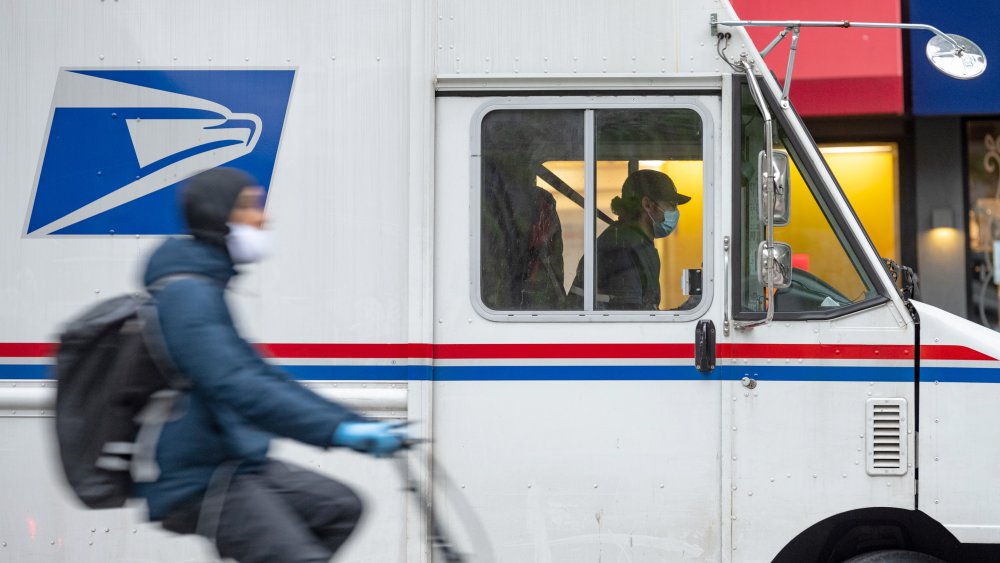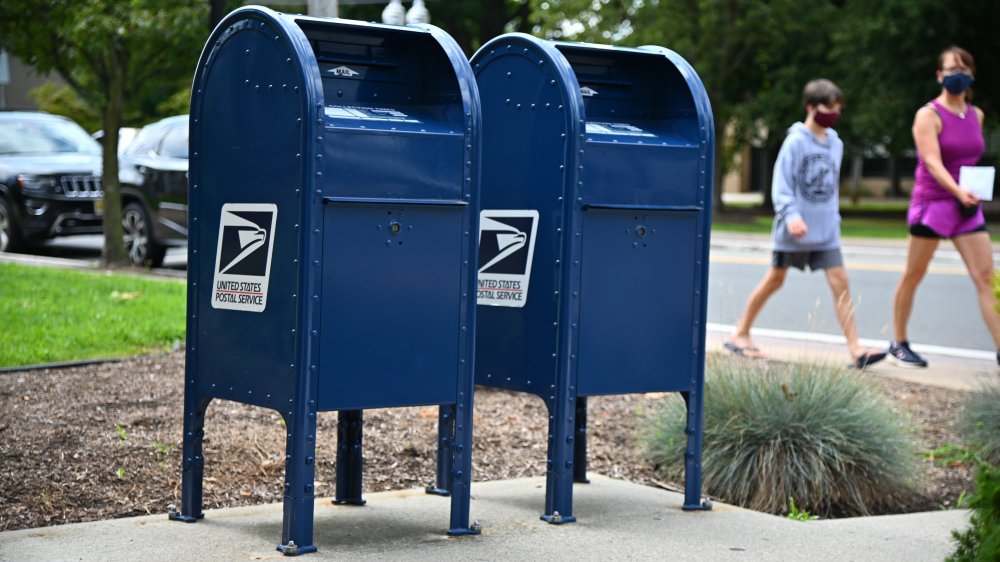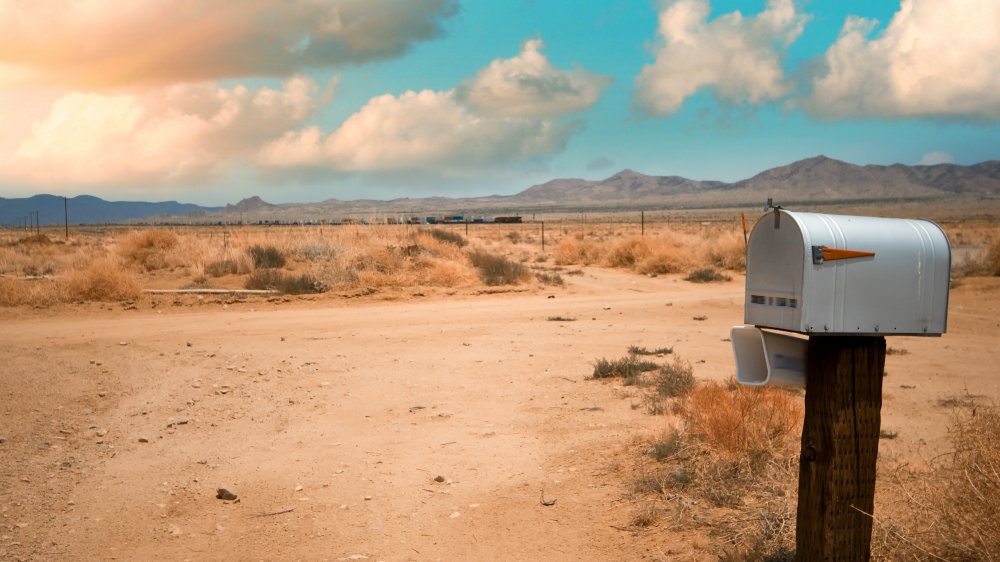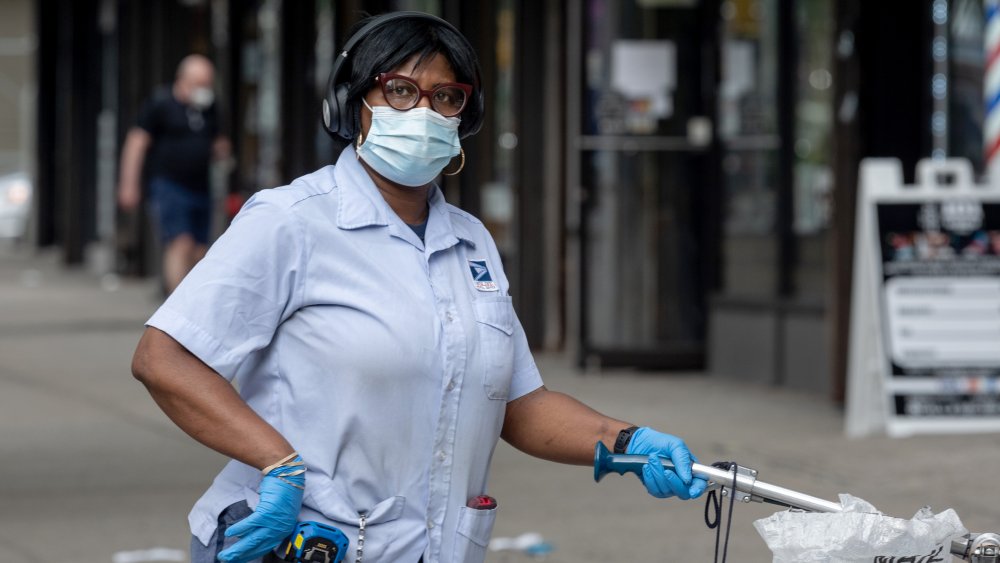What Really Happens If The USPS Shuts Down
Everybody knows that Post Office motto — "Neither snow nor rain nor heat nor gloom of night stays these couriers from the swift completion of their appointed rounds." Except it isn't. According to the United States Postal Service (USPS) itself, the agency has no motto. Those stirring sentiments come from the ancient Greek historian Herodotus, writing about the couriers delivering messages during the Persian Wars around 500 BCE. The words are engraved on the front of the 8th Avenue New York City Post Office. And aptly so.
What the Post Office does have, however, is this mandate, from the Postal Reorganization Act of 1970: "The Postal Service shall have as its basic function the obligation to provide postal services to bind the Nation together through the personal, educational, literary, and business correspondence of the people. It shall provide prompt, reliable, and efficient services to patrons in all areas and shall render postal services to all communities" (emphases added).
Unlike private carriers and delivery services, the USPS is required to deliver to everyone, everywhere. From the most densely populated urban neighborhoods to the farmhouse set back from the amber waves of grain, everybody gets their mail delivered. No exceptions. So — fun fact — private carriers often pay the USPS to do exactly that — deliver the one-off packages or letters that aren't cost effective otherwise.
Millions of Americans rely on the Post Office for crucial services
As History explains, the Post Office really is everywhere. Employees? A half-million people are involved with delivering the United States mail, working from over 40,000 post offices. And the agency's reach really does reach: the Post Office serves not only the 50 United States, but also Puerto Rico, American Samoa, the American Virgin Islands, and Guam. That reach delivers 212 billion pieces of mail each year, to 144 million homes and businesses. It's not-for-profit, but also self-supporting, through sales of stamps (as of 1847) and related products. Try to imagine life without birthday cards, Christmas cards, even magazines and the catalogs that are sometimes better written than the magazines.
The USPS has been deemed an essential service during the pandemic. And even though odds are (we're guessing) it's been a while since you've written an actual letter, requiring an actual envelope and actual stamp (did you send those Christmas thank-you notes? Time's a-wastin'), if you're reading this, odds also are you have internet access. And not everyone does.
The fact is, old-fashioned as the thought might seem, large portions of the United States rely heavily on mail delivery. Enormous sections of the country, especially rural areas, have no reliable high-speed internet, as Vox reports. The numbers get more intense in communities of Native Americans on Reservations.
The Post Office still provides a lifeline to rural America and Native American communities
Nearly 20 percent of Americans still pay bills by mail. They make donations to charitable organizations. They receive medications. The USPS literally provides a lifeline to millions upon millions of Americans — not only connection, but commerce, health, and well-being.
The USPS is required to deliver to everyone. No exceptions. Private carriers aren't. If the Post Office were to go out of business, speculation is rife that enormous areas of the country would be cut off — it wouldn't be cost effective for carrier routes to service the outlying areas of Oxford, Nebraska, or Fossil, Oregon, or any of thousands upon thousands of communities and outlying individuals.
To give some sense of how important the Post Office has been, and still is, Politico reminds us that in 1970, when the Post Office went out on strike, President Richard Nixon called out the National Guard to fill in.
Even in an increasingly digital age, the Post Office facilitates the nation's democracy at work: through voting by mail. Five Western states have successfully used vote-by mail: Oregon, Washington, Colorado, Hawaii, and Utah, reports Newsweek.
The Post Office reaches every corner of the United States
Concerns over the pandemic and public health and safety have led other states to institute or consider instituting the practice. A crippled Post Office would cripple the people's right to vote.
The Post Office is falling on increasingly hard times, with a number of factors compromising its financial health. Although package delivery is up, business mailing has dropped precipitously during the pandemic. Since it was established in 1775 (the first Postmaster General was Benjamin Franklin, says History), the Post Office has never shut down. And in the midst of all of the discussion, yes, there are signs of hope. Winnifred Gallagher, author of How the Post Office Created America, recently told The New Yorker, "at a time when the government is busy bailing out airlines, Congress simply has to accept that the U.S.P.S. is really too big to fail. You can't let it fail."
Now get to it. Go write — and mail — those thank-you notes.



